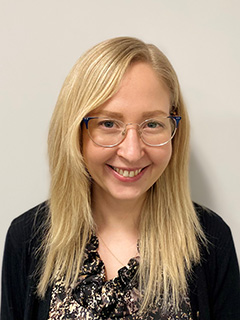2014 New Century Scholars Doctoral Scholarship, 2019 New Investigators Research Grant
Saving a Place at the Table for Aphasia
 Sarah Villard just wants everyone to be able to go to Thanksgiving and not feel uncomfortable. While that can be a tall order, she’s not talking about navigating dietary concerns or family dynamics, she’s talking about everyone–including people with aphasia–being able to attend to and follow along with conversations at the table.
Sarah Villard just wants everyone to be able to go to Thanksgiving and not feel uncomfortable. While that can be a tall order, she’s not talking about navigating dietary concerns or family dynamics, she’s talking about everyone–including people with aphasia–being able to attend to and follow along with conversations at the table.
“I’ve heard from many, many people with aphasia that while they can understand anyone in a quiet room, if there’s any kind of background noise, their brains have a difficult time processing it,” says Villard. “It’s something we all face–at a bar or a restaurant or the grocery store–but it can be more difficult for those who have this condition. And I want people to be able to participate socially in their communities.”
That is the question behind Villard’s research: Where does language and cognitive processing intersect for people with aphasia and what treatments might help? In Villard’s research project, Persons with Aphasia at the Cocktail Party: Influence of Linguistic-Semantic Factors on Selective Attention to Target Speech, for which she was awarded the New Investigators Grant in 2019, which sought to identify factors that make it more challenging for people with aphasia to understand speech in the presence of background noise. And how did that compare to the effort spent by people without aphasia.
“Think of it like a math problem. Even if two people are able to come up with the same correct answer for a problem, the amount of effort it takes to reach it can differ widely between people,” Villard explains. “We are trying to quantify that effort when it comes to language and aphasia.”
Villard wasn’t always honed into the aphasia community. In fact, she only even learned about speech-language pathology at age 28 after earning her bachelor’s degree in English and then a master’s degree in language and linguistics. At the time she was working in a middle school and got to know the school’s speech-language pathologist, who encouraged her to look into the field. Not feeling like she was on a solid career path with her earlier education, she decided to enroll in a dual masters and doctoral program in her home state at Boston University where she recalls being the “oldest person in my program.”
“I hadn’t really learned what it was to build a career and it took me a while to understand all the possibilities. But, as I was going through my program, I knew that research sounded really interesting. As I learned more about aphasia, I knew I wanted that to be my focus,” she recalls.
Of the funding she received from the ASHFoundation—the New Century Scholars Doctoral Scholarship in 2014 and the New Investigators Research Grand in 2019–Villard says they allowed her to grow as a researcher. The New Investigators grant, which she received at the end of 2019 became very useful when, in March 2020, she was faced with having to revamp her testing so it could be performed remote because of the pandemic. Additionally, the funding allowed her to hire an undergraduate student to help her research, which ended up being an incredible mentoring experience. Since then, she has received funding from the National Institutes of Health and is excited about where her research could lead.
“It was the first extramural grant I received, and it boosted my confidence. It was so exciting to realize that people thought my work and research was interesting, and it was truly the beginning of me becoming an independent researcher.”
View More Recipient Spotlights